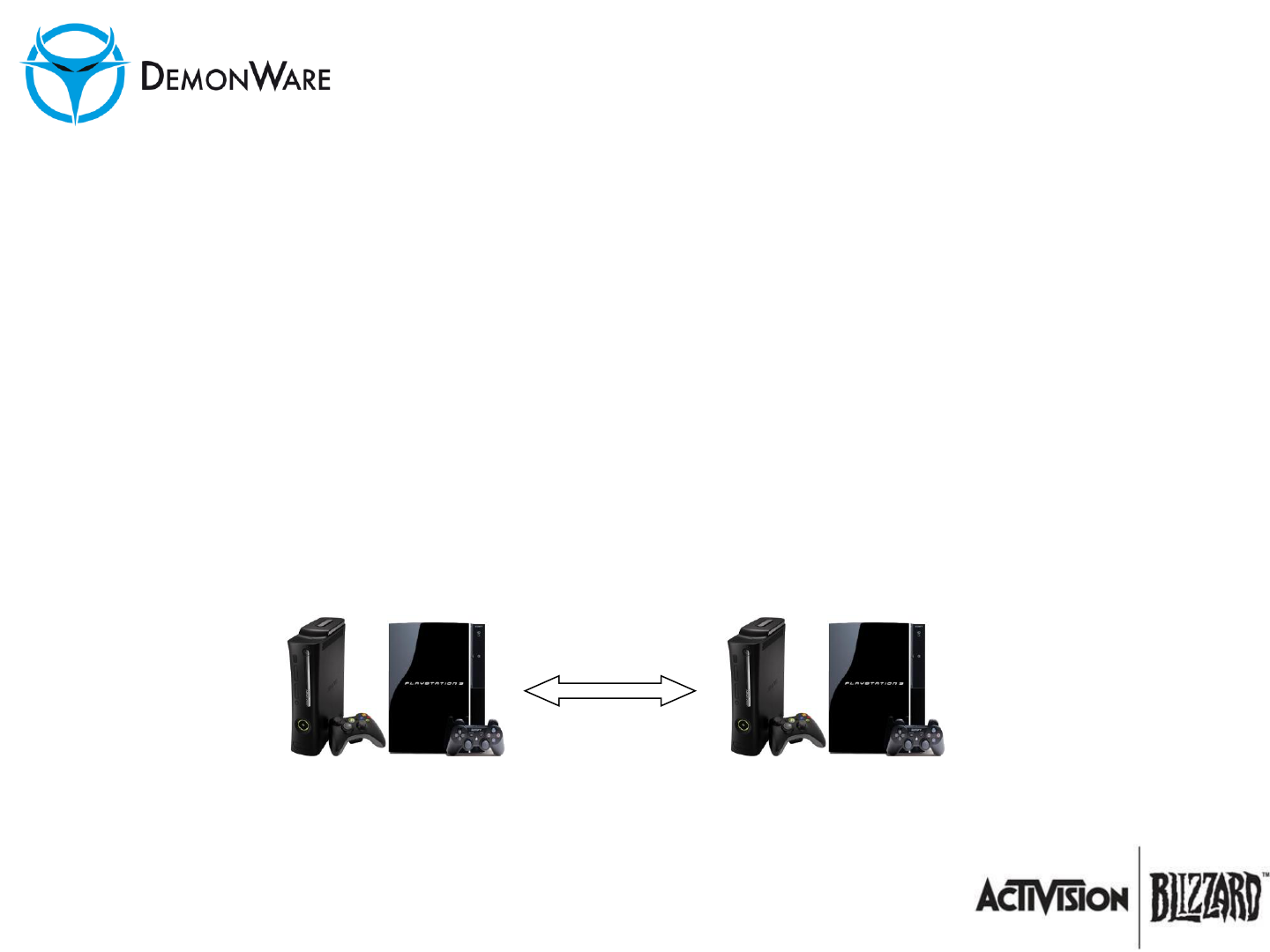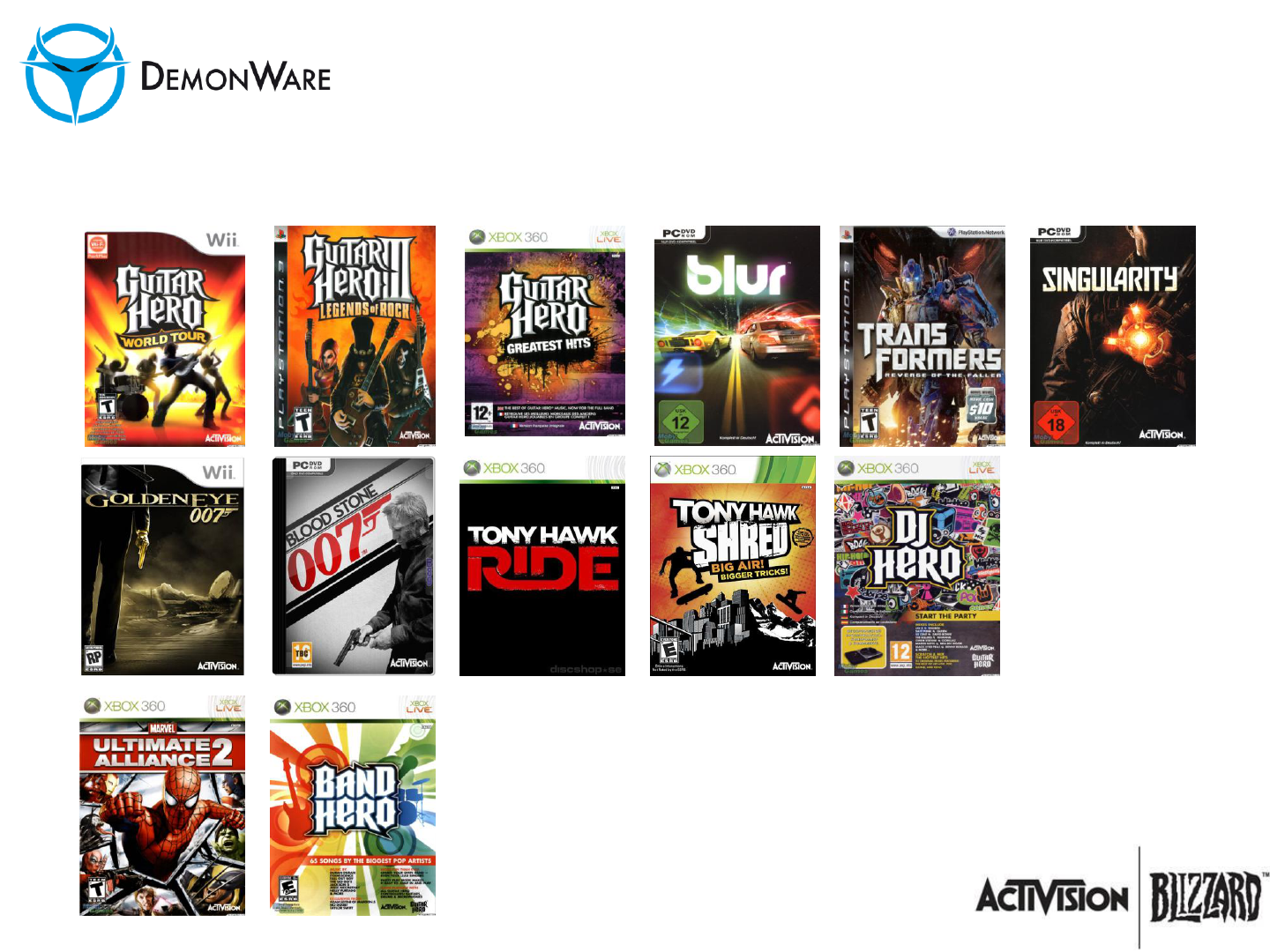
Erlang Factory London 2011
http://www.demonware.net/
Erlang and First-Person Shooters
10s of millions of Call of Duty Black Ops fans
loadtest Erlang
Malcolm Dowse
Demonware, Dublin

Erlang Factory London 2011
http://www.demonware.net/
Overview
• History of Demonware
– Who are we and what we do?
– Why we switched to Erlang 4-5 years ago
• Our server-side architecture
– How we use Erlang now
• What we have learned
– Mistakes made
– What we think would be great in the future
– What we love about Erlang

Erlang Factory London 2011
http://www.demonware.net/
Demonware – What we do
1. Multiplayer
• Middleware for client-client game state transport
• Encryption / NAT Traversal
• Connection management
• Peer-to-peer / Star topology

Erlang Factory London 2011
http://www.demonware.net/
Demonware – What we do
2. Lobby servers
• Matchmaking
• Leaderboards
• Stats Storage
• Messaging/Chat
• Audio/Video
• Website Linking
• Friends/Teams
• Anti cheat

Erlang Factory London 2011
http://www.demonware.net/
History
• Founded in 2003 in Dublin
– Developing middleware for game studios
• In 2005..
– Started hosting lobby servers
• In 2007..
– Switched to using Erlang
– Acquired by Activision (now Activision-Blizzard)
• In 2011..
– One of the world’s largest online game service
providers
– 60+ employees, Dublin and Vancouver offices

Erlang Factory London 2011
http://www.demonware.net/
Games that use us
Call of Duty

Erlang Factory London 2011
http://www.demonware.net/
Games that use us
…and many more!

Erlang Factory London 2011
http://www.demonware.net/
What we support
• The full online infrastructure for Call of Duty
Black Ops
– the world’s current best selling game.
• Four of the top 10 games on Xbox Live
• Over 2 million concurrent users
– Comparable in size to Xbox Live
• Over 150 million registered users
• Cross platform:
– Xbox 360, PS3, Wii, PC, iPhone/iPad
– Coming soon: 3DS, PSP2

Erlang Factory London 2011
http://www.demonware.net/
How we got into Erlang

Erlang Factory London 2011
http://www.demonware.net/
The beginning..
• Mid 2003
– Founded by former Trinity College Dublin students.
– Aim: sell client-side networking middleware to games
studios.
• Late 2004
– Lots of polite interest; few customers.
– Game studios wanted online servers, not middleware.
• Started creating a lobby services platform
– Xbox 360 had Xbox Live. It set the standard.
– Games studios needed something for Playstation
(and PC)

Erlang Factory London 2011
http://www.demonware.net/
2005 – C++/C++/Mysql
• Homebrew C++ server
– Single-threaded
– Dispatch requests into sub-processes per service
– Application logic was in C++ and used Mysql
• Problems
– One OS process per connected user is really bad
• Max of 80 concurrent users
• Luckily the first game didn’t sell well enough to hit that limit.
– C++ crashes a lot if code is immature
• Code was immature.
• It crashed a lot.

Erlang Factory London 2011
http://www.demonware.net/
2005/2006 – C++/Python/Mysql
• Rewrote all C++ business logic in Python
– Maintained a pool of OS processes
• Kept core server in C++
– Handles 1000s of concurrent connections
– Encrypts, decrypts, dispatches requests
– Asynchronous messaging between clients
– Licenses and duplicate login detection
• Problems remain
– C++ is the wrong language for concurrency
– Code was becoming impossible to maintain
– Poor error handling / debugging / metrics / scalability
– Had to disconnect all users to change configuration.

Erlang Factory London 2011
http://www.demonware.net/
2007 – Erlang/Python/Mysql
• Late 2006 / early 2007.
– Former developer rewrote the C++ server in Erlang
– Got a basic prototype running after a few weeks
– ~4 months of development before used by games studios.
– Went live for first time in mid-2007
• Improvements
– Robust: didn’t crash.
– Easier configuration
• able to reconfigure everything without affecting clients
– Better logging and administration tools
– Faster to develop features, far fewer lines of code

Erlang Factory London 2011
http://www.demonware.net/
Demonware in 2007
• Lots of customers
– Activision, Ubisoft, Codemasters, THQ.
– Acquired by Activision in May.
• Some big games..
– Splinter Cell Double Agent, Saints Row, Worms Open
Warfare, Colin McRae DiRT, Enemy Territory Quake
Wars
• But no monster blockbuster
– 20,000 concurrent users was a big title..
• Still a tiny company
– 11 devs, 3 ops, 3 managers

Erlang Factory London 2011
http://www.demonware.net/
Late 2007 – A blockbuster arrives

Erlang Factory London 2011
http://www.demonware.net/
Late 2007 – A blockbuster arrives
• The most popular game on the (then new) PS3
• Much pain and suffering for us
– .. and frustration for gamers.
– Number of users grew continually for 5 months.
– Every weekend brought a different bottleneck
– Lots of outages and late nights
• It was a crisis for the company..
– We had to grow up.
– Erlang caused us relatively very few issues
– Without the switch to Erlang the crisis could have
been a disaster.

Erlang Factory London 2011
http://www.demonware.net/
2007 and onwards
• Continual growth
– In concurrent online users (20k to 2.5 million)
– In requests per second (500 to 50k)
– In servers (50 to 1850)
• Spread across many data centres
– In staff (17 to 60)
• Spread evenly between Vancouver and Dublin
– In competence!
• And many new features/services
– The Black Ops launch (2010) was colossal
– Many separate standalone components
– Erlang/Python/Mysql is the core, but now with many exceptions

Erlang Factory London 2011
http://www.demonware.net/
How we use Erlang

Erlang Factory London 2011
http://www.demonware.net/
How we use Erlang
• Our core server for controlling Python
– Managing 100,000s of concurrent TCP connections
– Scheduling/queuing of tasks for python
– Metrics gathering (SNMP)
– Presence server (fragmented mnesia)
– Message passing
• Other standalone game-related servers
– Transient in-game data
– Testing bandwidth
– Ranking leaderboards
• In general:
– for concurrency, and gluing sequential code together

Erlang Factory London 2011
http://www.demonware.net/
TCP connections / task scheduling
• Two erlang processes per connected user
– simple_one_for_one supervisor
• Delegate work to python OS processes
– managed by a large supervision tree
– dedicated task queues for some request types
– Can restart/update python code without
affecting users
• Periodic tasks
– Use a modified timer module.

Erlang Factory London 2011
http://www.demonware.net/
A presence server
• Needed to
– Ensure a user can’t be logged in twice
– Prevent duplicate license keys (PC)
– Provide consistent, distributed snapshot of who is
connected
– In-game messaging
• Use fragmented mnesia
– Scales linearly
– Robust
• Our biggest single cluster:
– 60+ 16-core Dell RC10s

Erlang Factory London 2011
http://www.demonware.net/
Metrics / SNMP
• The erlang SNMP libraries get good
use
• Vital for monitoring
– online users
– requests per second
– request times
– queue times
– logins/logouts per second
– disconnect reasons
• The workhorse is
ets:update_counter.
• Easy to auto-generate cross-cluster
metrics

Erlang Factory London 2011
http://www.demonware.net/
Configuration
• Each game has a different, often complex
configuration
• Our Erlang configuration code allows
– Complex option settings and validation
– Defaults, instantiation, inheritance
– Cross-cluster upgrades
– Rollback on failure
– Language agnostic
– Puppet integration
• Making something configurable should be
simple and painless

Erlang Factory London 2011
http://www.demonware.net/
Webconsole/webservices
• YAWS is used internally
– Webconsole
• Live debugging
• Local development
– Webservice interface
• Games studios can remotely
– Update the message of the day
– See how popular certain game features are
• Used by us to control to our clusters remotely

Erlang Factory London 2011
http://www.demonware.net/
Game-related services
• Leaderboard ranking
– Keeps huge leaderboards (15m+ users) ranked in real time.
– Uses ETS and a modified gb_trees module.
– The rank is a feature of the tree itself
• In-memory key-value store
– Built on ETS.
– Grouping online users into categories
– Dynamic chat channels
– Presence information
• Bandwidth testing
– UDP packet blast against an erlang server
– Client gets an estimate of his bandwidth.

Erlang Factory London 2011
http://www.demonware.net/
Some Lessons we’ve Learned
about Erlang

Erlang Factory London 2011
http://www.demonware.net/
Lessons: Basics, but important
• Learn to use the core datatypes:
– Iolists, records (not tuples), binaries/bitstrings, refs,
atoms.
• Learn to think functionally + concurrently
– Tail recursion, functional datastructures, higher-order
functions.
– New processes really are that cheap.
• Simple options can go a long, long way
– Kernelpoll
– Bind schedulers to cores

Erlang Factory London 2011
http://www.demonware.net/
Lessons: OTP
• Use OTP religiously
– Use gen_servers / supervisors
– Avoid touching receive / !.
– Avoid touching spawn/spawn_link,trap_exit
– Split reused components into their own OTP
applications
• Try to keep modules small, and either
– Non side-effecting / sequential
– An OTP behaviour (gen_server, supervisor etc.)

Erlang Factory London 2011
http://www.demonware.net/
Lessons: KIS(S)
• Avoid..
– Inter-node dependencies
• Even though Erlang makes it easy..
• Avoid having nodes with special responsibilities
• Expect high latency / inter-node network issues
– Complex inter-process dependencies
• Be very afraid of processes which all rely on each
other
• Casts instead of calls.

Erlang Factory London 2011
http://www.demonware.net/
Lessons: Bottleneck processes
• If a process receives many messages
– Create a pool of them
– Make sure they don’t do much intensive work
– Manually purge message queue?
• If a process does actual work
– Make sure it’s left alone to do it
– and it decides when it wants to do more
• Example
– Logging, metrics.

Erlang Factory London 2011
http://www.demonware.net/
Lessons: use ETS
• Standard solution to many in-memory storage
problems
– Blisteringly fast
– Linked to process (automatic cleanup)
– No monster crashdumps
– Avoids single-process bottlenecks
• Know its limitations..
– Try not to reinvent mnesia
– Distributed copies of ETS tables? Explicit indexes?

Erlang Factory London 2011
http://www.demonware.net/
Lessons: Use Mnesia... with care
• Extremely powerful
– Distributed, fragmentation, atomicity, transactional
– One of the main reasons we moved to Erlang
• But complex
– A lot of subtle, custom code written for error cases
• Partitioned network; node death; fragment distribution
• mnesia ~= traditional RDBMS?
– Powerful, fully featured… but so complex, you’ll
swear and pull your hair out at times.
– ETS: Simple, fast… but will at times lack the tools you
need.

Erlang Factory London 2011
http://www.demonware.net/
Lessons: Testing/Profiling
• Automated tests
– Have them, and try to respect them
– We use eunit
– Make it easy to test a full cluster
– Rolled our own system for stubbing out modules
• Kill random erlang processes
– because something else almost certainly will
• Pay attention to the dialyzer and fprof
• Nothing beats heavy-duty end-to-end loadtests
– Simulate 2 million users!

Erlang Factory London 2011
http://www.demonware.net/
Lessons: Miscellaneous
• Obvious, but .. keep your clusters apart
– Different VLANs, cookies
• Beware sharing cores with other OS processes
• Process priorities
– 10,000 relatively unimportant processes running slightly
inefficiently will clobber one vital process
• Hot swaps and code replacement:
– Amazing, but often more effort than it’s worth
• In case things go wrong..
– Add kill-switches, metrics and graphs for everything
– Have a collection of helper tools, scripts.
– Get used to using remote shells

Erlang Factory London 2011
http://www.demonware.net/
Lessons: Be polite
• Your co-workers don’t all care about Erlang like
you do
– Just three/four Erlang developers in Demonware
• Don’t force the user of your software to
– Use Erlang syntax
– Read Erlang crashdumps
– Have to understand erlang code
• Either
– Make them all converts
– Accept that it’s a niche language in the company

Erlang Factory London 2011
http://www.demonware.net/
Some things we’d love to see
in Erlang

Erlang Factory London 2011
http://www.demonware.net/
Mnesia improvements?
• An Mnesia that lives and breathes network
outages and node crashes.
– Mnesia-Cassandra hybrid?
– Eventual consistency
– Automatic rebalancing
– CAP theorem says there’s no magic bullet.
• Automatic clean up logic
– Mnesia data divorced from process responsible for it
– linking of rows to processes/nodes?
– Distinguishing old and new incarnations of a node.

Erlang Factory London 2011
http://www.demonware.net/
A neater OTP interface?
• receive, !, link, spawn is the Erlang “assembly
language”
– But you have still have to know how it works.
• More flexible supervision trees
– Hand-crafted dependencies
• Instead of complex nesting of one_for_one, rest_for_one, etc.
– Hand-crafted restart strategies
• Exponential backoffs?
– Wrap process monitoring too?
• Processes should respond to system messages quickly
– Writing well-behaved blocking / busy processes is messy
– gen_background_script?

Erlang Factory London 2011
http://www.demonware.net/
Easier inter-language integration?
• Erlang isn’t a general purpose language
– It’s great for any hard, concurrency problem
– .. But we would never use it for business logic
– The ease of concurrency doesn’t make up for the
difficulty in interfacing with other languages.
– It’s too easy to just muddle through without Erlang
• Make it easy for scripts to be an erlang process
– Standardise a subset of the protocol.
– jinterface, twotp, rinterface etc.

Erlang Factory London 2011
http://www.demonware.net/
Static Types, Dynamic Hacks?
• A statically typed sub-language
– A more expressive, less forgiving Dialyzer
– No side-effecting allowed
• Confined to modules, helper code that is sequential
– Being able to enable run-time warnings for dialyzer
errors?
• More dynamic features
– Possible to monkeypatch functions?
– Easier viewing/modification of running processes.
– Grotesque hacks are sometimes needed.

Erlang Factory London 2011
http://www.demonware.net/
A Gentler Learning Curve?
• In Erlang
– (Very) hard things are possible..
– But (very) easy things still aren’t easy
– Moving to Erlang is a big commitment
– Have to first get through the sequential language.
• So, all the usuals
– Standard guides, coding styles
– Documentation aimed at non-experts
– Friendly syntax
• A simple single-step, clustered OTP server?
– .. easy to understand, and written the right way.

Erlang Factory London 2011
http://www.demonware.net/
What we love about Erlang

Erlang Factory London 2011
http://www.demonware.net/
Pretty much everything else..
• But in particular..
– Effortless concurrency
• The complete solution for hard concurrent
problems.
– Open source
• We can look under the hood and play around
– Remote shells
• An absolute life-saver.
– Its sheer robustness and reliability
• Many months of uptime is par for the course

Erlang Factory London 2011
http://www.demonware.net/
Black Ops – 24 hour stats

Erlang Factory London 2011
http://www.demonware.net/
In short
• Erlang helps make 10s of millions of
gamers happier across the world
• In Demonware, if gamers are happy then
so are we.

Erlang Factory London 2011
http://www.demonware.net/
In short

